Hassan Ibrahim | Omar Alaa Eldin
Statements made by Hassan Soufan, a member of the High Committee for the Preservation of Civil Peace in Syria, ignited outrage in the Syrian street, raised fears of undermining the accountability and transitional justice process, and increased tension among Syrians. This was after Soufan confirmed that the person accused of committing war crimes against civilians, “Fadi Saqr,” had been granted “protection” by the Syrian leadership instead of being arrested.
The issue is not limited to Fadi Ahmad, known as “Fadi Saqr,” a commander in the Syrian National Defense Forces, an auxiliary to the ousted Assad regime, accused of responsibility for the Tadamon massacre (which occurred on April 16, 2013, in the Tadamon neighborhood of Damascus, resulting in the execution of 41 people who were buried in a mass grave). He has turned into a “broker of settlements” to release detainees from the new government’s prisons. He is joined by other figures deeply entrenched in Syrian bloodshed who were prominent tools in the killing machine of the Assad regime, and who remain far from trials even after more than six months since the regime’s fall.
Soufan’s statements came a day after the release of dozens of officers from the former regime, whom Soufan described as “active officers” since 2021, who surrendered voluntarily at the Iraqi border. He added that those released had “not stained their hands with blood,” and they were freed due to the lack of justification for their continued imprisonment, and in light of the communal peace necessities in the coastal areas following exceptional tensions experienced.
Despite Soufan’s remarks that these measures are not a substitute for transitional justice, and that the release of these officers is part of the peace process meant to alleviate social tension, survivors and victims’ families considered that community peace should not come at the expense of their rights and unresolved wounds. Meanwhile, human rights activists and legal experts asserted that the country is not on the path to justice, and that these steps lack a legal basis, establishing a trend of revenge and retribution that paves the way for further crimes in the pursuit of rights.
In this report, Enab Baladi highlights the outrage over granting “protection” to war criminals and delaying the justice process and conveys the voices of survivors and victims’ families. It discusses with legal experts and specialists the effects of the release of those involved in the blood of Syrians on civil peace and its relationship with the government, the legal basis for granting “protection,” and its ramifications.
Measures “making the situation worse”
Hassan Soufan, a member of the Civil Peace Committee, stated during a joint press conference with the spokesperson of the Ministry of Interior, Nour al-Din al-Baba, which took place in Damascus on June 10 and was attended by Enab Baladi, that the released officers underwent investigations and no charges of war crimes were proven against them, and that keeping them in prison does not serve a national interest and lacks legal legitimacy.
He affirmed that “transitional justice does not mean holding everyone who served the former regime accountable, and accountability is for the major criminals who committed grave crimes and violations,” believing that these measures are not a substitute for the transitional justice that has already begun, which is the responsibility of the National Committee for Transitional Justice, formed by presidential decree, clarifying that the release of these officers is part of the peace process that helps to ease social tensions.
Soufan pointed out that having figures like the former leader of the National Defense, Fadi Saqr, within this process plays a role in dismantling tensions and resolving problems and confronting the dangers facing Syria.
He said, “We understand the pain and anger that the families of the martyrs feel, but we are in the phase of civil peace and are forced to make decisions to secure a relative stability for the upcoming phase.”
Hours after the conference held on June 10, Syrian Information Minister Hamza Mustafa stated that the released officers and personnel surrendered voluntarily to the state, adding that the transitional justice process has begun and is awaiting the proposals of the independent committee to be shaped.
Mustafa mentioned that what occurred is not a final judgment for transitional justice, and that the Syrian state is fully aware of the heavy price paid by Syrians to gain their freedom.
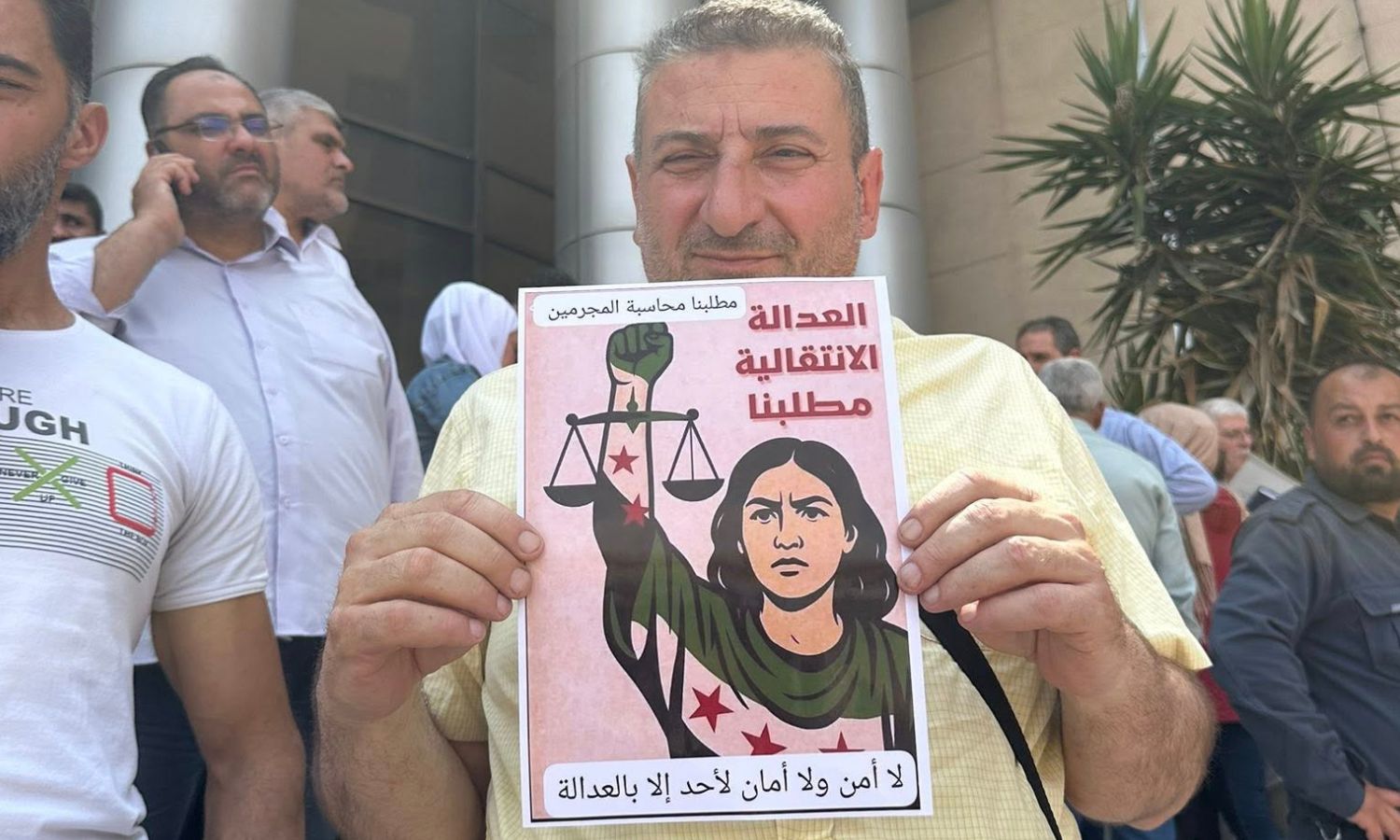
A stand in front of the Judicial Palace in Aleppo supporting the enhancement of transitional justice as a basis for building a state of law – June 10, 2025 (Maan Jazmati/Facebook)
Saqr: I’m just a leader
In contrast, Fadi Saqr denied his involvement in the Tadamon massacre, claiming that he was appointed as the commander of the National Defense militia after the massacre. He stated in an interview with The New York Times newspaper that he did not receive any pardon from the government and expressed readiness to submit to the judiciary.
The National Defense militia is defined as armed forces auxiliary to the ousted Assad Army, which included local fighters and participated in assaults on cities and villages.
Saqr told the newspaper, “The state (the new authorities) has been clear with me from the beginning; had the Ministry of Interior had any evidence against me, I wouldn’t be working with them today.”
He expressed his willingness to submit to the judiciary, according to the newspaper, stating, “I will submit myself to any judicial decision, according to the proper legal procedures.”
He considered that his background, not only as an Alawite but also as a militia leader loyal to the regime, has granted him the credibility to convince supporters of the former regime not to abandon the new Syrian government, according to what was reported by The New York Times.
Yet the pivotal question remains, as Saqr told the newspaper, “Will the revolution’s supporters accept them as partners in the homeland?” Adding, “The name Fadi Saqr is a test of the possibility of coexistence between the two sides of the conflict.”
Fadi Saqr held the leadership of the National Defense in Tadamon and then in Damascus, according to the Syrian Memory Organization, and his leadership of the National Defense in Tadamon coincided with the commission of the Tadamon massacre. He was among the leaders who carried out the massacre, having led the militia in 2012, while the Tadamon massacre occurred in 2013.
The Tadamon massacre was exposed by an investigation by The Guardian newspaper in April 2022, which revealed that the Syrian regime forces committed a massacre in the Tadamon neighborhood of Damascus on April 16, 2013, resulting in the killing of 41 people who were buried in a mass grave.
Saqr was a manager in the Trade Establishment in Damascus at the beginning of the Syrian revolution in 2011, according to the “Who Are They/Manhom” website. He left his job to join the Popular Committees and then the National Defense.
He was appointed commander of the Tadamon sector in the National Defense and then became the commander of the northern region of the National Defense, Deputy Commander of the Damascus center for the National Defense, and then the head of the Damascus centers, according to the Syrian Revolution Archive, but Enab Baladi could not find the exact dates for his progression in these positions.
He is credited with the success of several settlements and reconciliations in Damascus and its countryside that occurred after sieges or bombardments and massacres perpetrated by the Syrian regime forces.
Civil peace and transitional justice
The ambiguity remains prevalent in the official Syrian discourse regarding national peace and transitional justice. In February, Syrian transitional phase president, Ahmed al-Sharaa, stated that the government is pursuing senior officers in the Assad regime and that there will be no amnesty. He added that there is a thin line between transitional justice and civil peace, vowing to pursue anyone who has committed crimes against the Syrian people, especially the “big heads.”
Hassan Soufan, in his statements, considered that stabilizing the path of national peace is “actually prioritized even over the path of transitional justice,” stressing that the absence of even a minimum level of national peace makes achieving transitional justice impossible.
What Soufan discussed does not rest on the tasks of the Committee for Civil Peace, which was formed following a decision by Syrian President Ahmed al-Sharaa on March 9, and was composed of Hassan Soufan, Dr. Anas Airout and Dr. Khaled al-Ahmad, in light of security tensions in the Syrian coast.
The committee is tasked with three main responsibilities: direct communication with the residents of the Syrian coast to listen to them, providing necessary support to the residents of the coast to ensure their security and stability, and promoting national unity during this sensitive phase.
National peace
A state of stability and peaceful coexistence within society, coupled with a rejection of all forms of violence and fighting, whether through advocacy, incitement, or justification.
The goal of national peace is to enhance a culture of dialogue and understanding between the various components of society, respect human rights, uphold the rule of law, and ensure political and economic participation for all individuals without discrimination.
Transitional justice
A system and procedures aimed at doing everything necessary in communities that are trying to rebuild themselves anew and transition from a violent history marked by severe human rights violations committed in the context of oppression or armed conflict, and recognizing violations, preventing their recurrence, meeting justice demands, restoring the social fabric of local communities, and building sustainable peace.
Transitional justice aims to recognize the victims of past abuses as rightful claimants, enhance trust among individuals in the same community, build individuals’ trust in state institutions, strengthen respect for human rights, and promote the rule of law. Consequently, transitional justice seeks to contribute to reconciliation and prevent new violations.
It is the responsibility of states to ensure effective redress mechanisms for victims of human rights violations, fulfilling their rights to the truth, justice, and reparations.
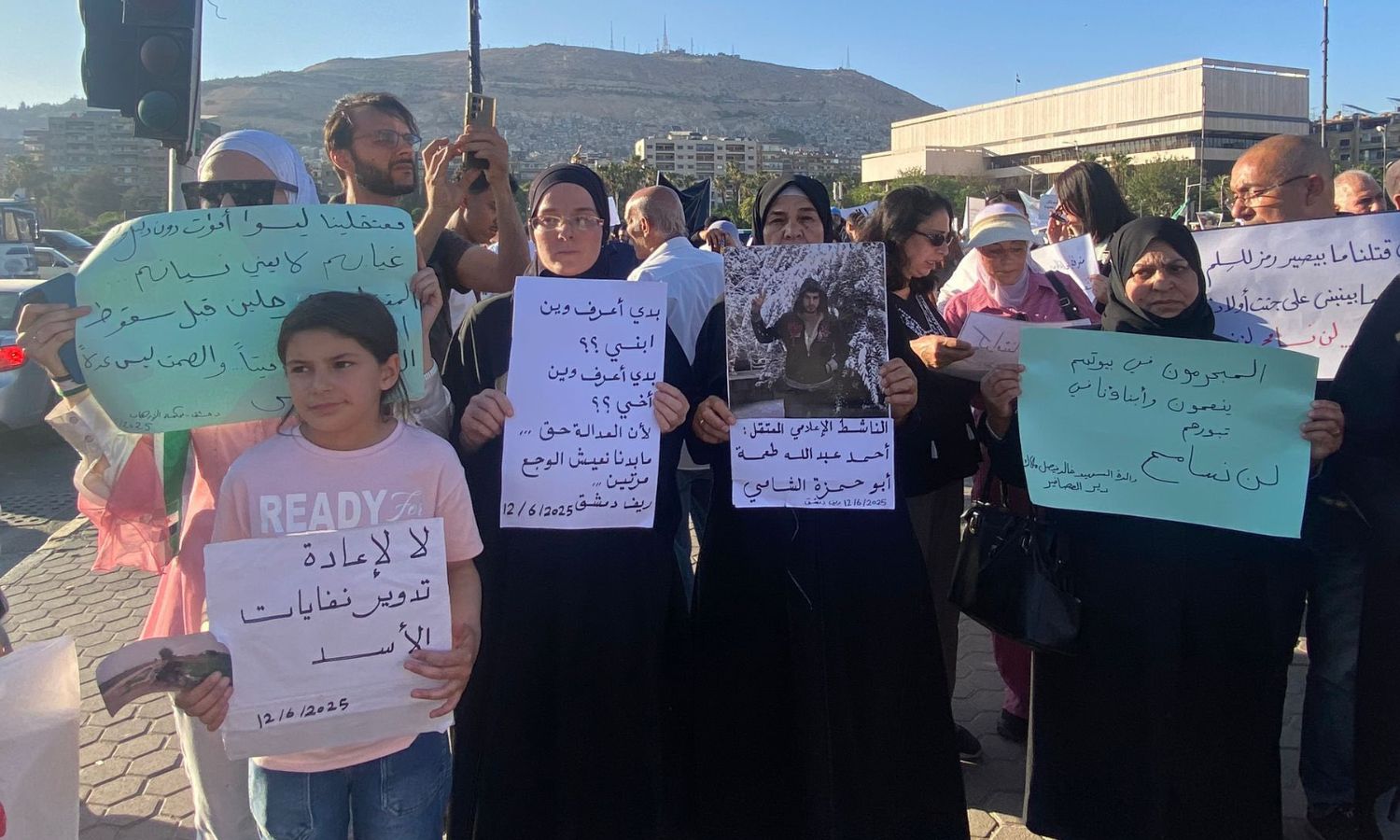
A stand in the Omayyad Square demanding real transitional justice – June 12, 2025 (Families for Freedom Association/Facebook)
Survivors and victims’ families: Do not kill us twice
The Military Operations Administration which oversaw the battle of “Deterrence of Aggression” that led to the fall of Bashar al-Assad’s regime, launched campaigns to pursue remnants of the previous regime in several areas, following by opening “settlement” centers for elements and officers of the regime in various provinces, which began subsequent operations to pursue those who did not undergo settlement and hand over their weapons.
Syrian Defense Minister, Murhaf Abu Qasra, stated in a previous interview that settling the situation of elements of the ousted Assad regime does not cancel the subsequent legal accountability process. The goal of the settlement is to stabilize the situation, prevent chaos, and reinforce the current status until these individuals are dealt with through the relevant authorities, and those facing criminal charges or torture must be held accountable through judicial institutions.
So far, no judicial rulings have been issued regarding the accountability of former regime leaders who have been arrested or undergone settlements. One of the notable figures who underwent settlement is the former commander of the Republican Guard, Talal Makhlouf, who is currently under sanctions from the European Union due to crimes he committed or participated in against civilians, as well as British sanctions since 2015 and American sanctions since 2017.
Unions and associations of families of victims and missing persons have condemned the release of those accused of crimes against Syrians. Enab Baladi has documented nine calls for protests opposing the rehabilitation of “war criminals,” demanding “actual accountability without evasion,” and genuine transitional justice, stating, “There is no reconciliation before accountability, no peace before revealing the truth, and no stability before vindicating the oppressed.”
Among the entities calling for these protests is, for instance, the Bar Association in Homs, which considered the Committee for National Peace’s decision to grant amnesty to Fadi Saqr as illegal, stating that the release of military officers encroaches upon the jurisdiction of the National Transitional Justice Body and contradicts the simplest legal principles, as a conviction or acquittal decision should be issued by the judicial authority.
The association stated that granting “protection” or unconditional amnesty to certain individuals without fair and transparent trials constitutes a blatant violation of justice principles and undermines the confidence of the Syrian community in transitional institutions.
Abuse of victims and their families
The founder of the Association of Detainees and Missing in Sednaya Prisons (ADMSP), Diab Sariya, considered that granting safety to those involved in committing war crimes in Syria is not the right of any person or entity, whether from the Committee of National Peace or the President of the Republic. They cannot grant amnesty for war crimes; it is neither within their authority nor their right, neither legally nor morally.
Regarding the involvement of the perpetrators and war criminals in playing a positive role in the “liberation of the capital,” as is commonly spoken, or in civil peace, Sariya said that this role must be clarified to the Syrians, and regardless of its nature, it does not mean that “God has forgiven what has passed and has erased the blood-filled past of the criminals.”
Sariya, a former detainee, declared in an interview with Enab Baladi that what is happening is shameful and offensive to the victims and their families, as well as to the survivors and their sufferings. The families will see that the government is not interested in securing their rights, which turns the country into a lawless jungle and pushes individuals to take justice into their own hands.
Undermining, not strengthening, national peace
The Director of the Documentation Department at the Syrian Network for Human Rights (SNHR), Nour al-Khatib, told Enab Baladi that national reconciliation is not built on the denial of justice but on its achievement. Granting “protection” to individuals facing documented accusations of committing serious violations against civilians, under justifications such as their “positive role” or “contributing to stopping bloodshed,” threatens to entrench a culture of impunity and undermines any serious path towards transitional justice.
Al-Khatib added that the transitional phase in Syria is complex and fraught with security and societal challenges, and any responsible approach must take into account the sensitivity of the context. However, this does not mean legitimizing political or security settlements at the expense of justice and the rights of victims.
Using terms like “reconciliation” and “stopping bloodshed” to justify escaping accountability may actually contribute to undermining national reconciliation rather than strengthening it, as it solidifies the feeling among victims that their voices are unheard and that the pain they experienced can be overlooked for the sake of temporary balances.
Nour al-Khatib, Director of the documentation department at the Syrian Network for Human Rights
Al-Khatib considered that linking transitional justice solely to holding accountable those classified as “major criminals” is a significant oversimplification of this concept, which consists of integrated pillars that include accountability, recognition of victims, reparation, the right to knowledge, and guarantees of non-repetition. She added that neglecting these principles contributes to increasing fragility rather than building societal trust.
Journalist specializing in human rights, Jihan al-Ahmad, believes that Soufan’s statements embarrassed the judiciary and the public prosecution and marginalized them. Despite his claim that the country’s laws represent a reference for the Committee of National Peace, she considered it essential to have a legal expert accompany these committees to avoid such embarrassments and worsening the situation.
Al-Ahmad stated to Enab Baladi that she sensed fears among families in certain shared areas from civil society organizations that legal accountability could turn into individual rights. What Soufan mentioned sent a negative message to the families of victims and survivors that their rights are being trampled, consequently opening the door to seeking justice by oneself.
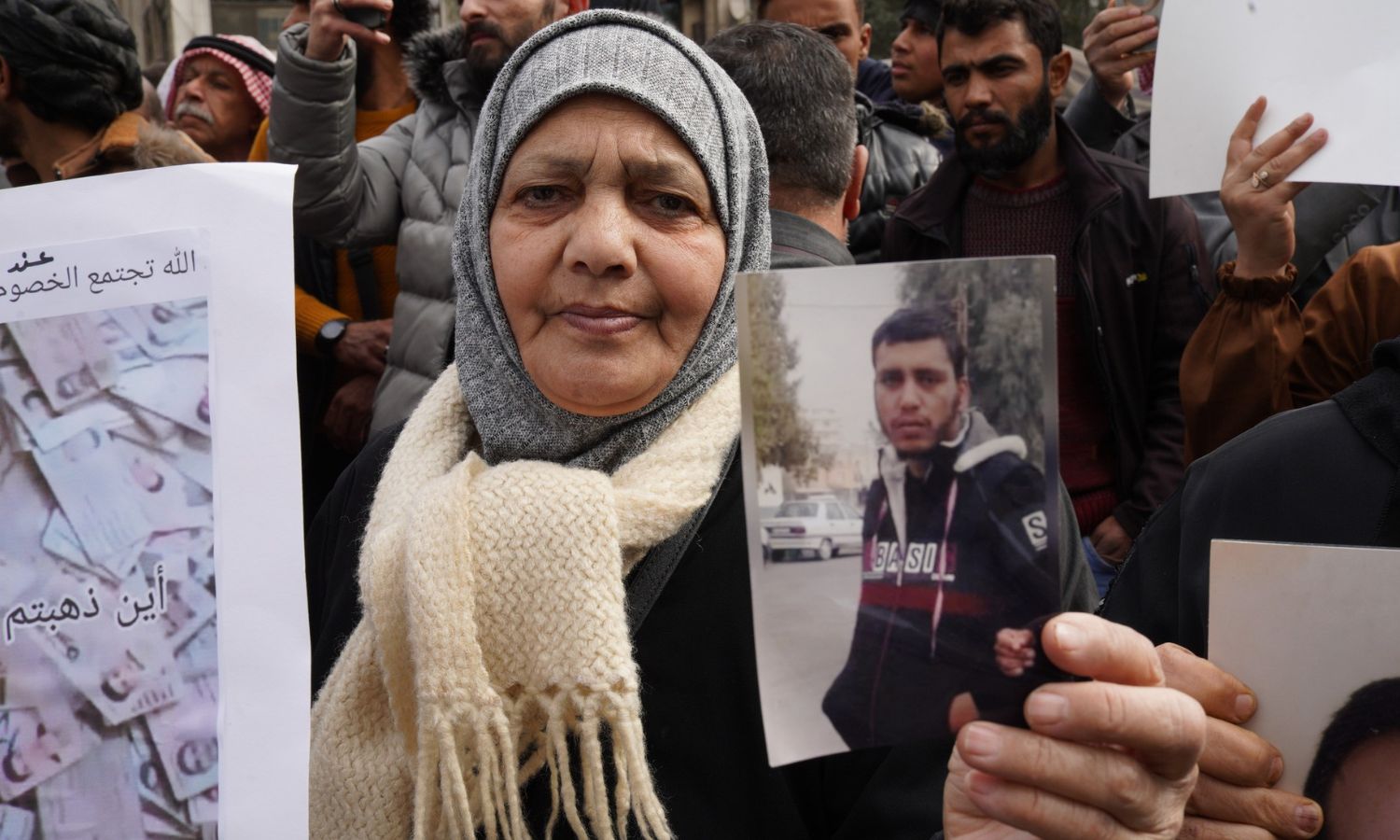
A stand in Damascus by Syrian families demanding justice and accountability for criminals and revealing the truth about the fate of the missing – January 26, 2025 (Families for Freedom Association)
No legal jurisdiction… overlapping authorities
On May 17, the transitional president of Syria, Ahmed al-Sharaa, issued decrees No. “19” and “20” for the year 2025, establishing the National Authority for the Missing and the “ Authority for Transitional Justice.
The Missing Persons Authority is tasked with searching for and revealing the fate of the missing and forcibly disappeared individuals, in addition to documenting cases, creating a national database, and providing legal and humanitarian support to the families of the missing.
Meanwhile, the Transitional Justice Authority is concerned with uncovering the truth about the grave violations caused by the previous regime, holding accountable those responsible in coordination with the relevant authorities, compensating victims, and embedding the principles of non-recurrence and national reconciliation.
A week after the decree, the head of the Transitional Justice Authority, Abdel Basset Abdel Latif, confirmed that justice in Syria “will not be vengeful,” but rather based on uncovering the truth, accountability, preventing impunity, and reinforcing the rule of law. He emphasized that this authority would be an effective platform for restoring the rights of victims, honoring them, commemorating their memories, and providing reparations, leading to comprehensive national reconciliation that preserves the dignity of all Syrians.
Abdel Latif pledged “full commitment to diligent and persistent work to fulfill this mission, achieving the aspirations of the Syrian people in all its components,” through the following:
- Uncovering the truth about the grave violations caused by the former regime.
- Holding accountable those responsible for those violations in coordination with the relevant authorities.
- Compensating the damage suffered by victims.
- Embedding principles of non-recurrence and enhancing national reconciliation.
The establishment of the Transitional Justice Authority received international and local approval, alongside human rights critiques, including a warning from Human Rights Watch that the limited mandate of the Transitional Justice Authority undermines its credibility and sidelines many victims. Meanwhile, Syrians are still awaiting updates from it, after Abdel Latif announced that the stated work plan has a duration of 30 days.
Amnesty is not within the powers of the Civil Peace Committee
Legal researcher at the Syrian Dialogue Center, Nawras al-Abdullah, does not believe that the Civil Peace Committee has the right to grant amnesty that prevents prosecution or partial amnesty, as it does not hold any official legal jurisdiction. He confirmed that it is not a “transitional justice authority with extraordinary powers,” clarifying that what the committee mentioned is not granting amnesty for Fadi Saqr or others, rather it is the military operation leadership that does so in exchange for previous cooperation or sensitive current services.
Al-Abdullah stated, in an interview with Enab Baladi, that some of Soufan’s statements were “inappropriate,” and could have been made later by the Transitional Justice Authority, which holds the jurisdiction to track the files of involved individuals and refer them to or not to specialized judicial circles, as it has the original jurisdiction to condemn or declare the innocence or non-responsibility of individuals.
He reminded that the decree for forming the Civil Peace Committee and its tasks concentrates on communication and works to promote unity, confront hate speech, and address daily issues for residents or any risks, noting that the decree does not grant the committee any powers of a judicial nature or directly related to the justice file.
Considering the decrees issued for the establishment of the Transitional Justice and Missing Persons Authorities, the researcher at the Syrian Dialogue Center believes that they are very brief decrees and open the door for the fragmentation of the transitional justice file between the authorities. He views the overlap of the Peace Committee’s powers in the justice file as an indicator of this.
Regarding the legality of what the Civil Peace Committee has done, Syrian lawyer and rights activist Aref al-Shaal stated to Enab Baladi that the recommendation to release detainees and free them and to grant amnesty is not within the jurisdiction of the Civil Peace Committee, nor is it the jurisdiction of the Ministry of Interior as indicated by Hassan Soufan; this matter is solely within the jurisdiction of the judicial authority.
From a legal perspective, the Director of the Documentation Department at the Syrian Network for Human Rights, Nour al-Khatib, believes that any decisions granted to individuals involved in serious violations, whether in the form of “settlement” or “protection,” do not extinguish the right of victims or their families to resort to the judiciary, either within Syria or through international judicial mechanisms, especially in cases involving actions rising to the level of crimes against humanity or war crimes, which by their nature do not lapse over time.
Caution and restraint or a new beginning
Lawyer Aref al-Shaal proposes legal paths to achieve civil peace without infringing on victims’ rights, most notably restraint and caution in granting amnesty to suspects and not obstructing any judicial investigations into crimes suspected of being committed.
To avoid legal conflicts between the Civil Peace Committee and the Transitional Justice Authority, al-Shaal believes that the Civil Peace Committee should “adhere to the powers granted to it by the decree establishing it,” and for this purpose, it can communicate with executive state bodies and propose recommendations to them, requesting what serves its objectives, except for interfering in judicial matters.
Until the legislative council is formed, al-Shaal suggests that the Civil Peace Committee “comply with the state’s legal system and consult legal experts to accompany all their activities.”
For his part, researcher Nawras al-Abdullah believes that the correct beginning lies in stopping and launching a serious consultative track led by the authority, the relevant ministries, and previous authorities in a well-organized and comprehensive manner, defined within a short period (three months, for example), to respond to many questions, resolve them, and produce clear rules that may abolish the trilogy of committees (Civil Peace, Transitional Justice, and Missing Persons) or maintain them but with clear lines or preserve them under one umbrella that includes subsidiary committees working in harmony within a clear framework.
We must recognize that the path to justice is long and requires the maximum mobilization of public opinion, victims, and their families. Therefore, it is essential to clarify simple and fundamental answers, such as the limits of amnesty, the difference between it and forgiveness, and the mechanisms that connect the accountability of major criminals with the redress of victims, even from other criminals.
Nawras al-Abdullah, Researcher at the Syrian Dialogue Center
Al-Abdullah considered that the vast number of perpetrators and victims does not mean closing the file completely, as this will not establish stability and civil peace; instead, it would reinforce individual vendettas or anger and a lack of trust in the authority and society among victims and their families.
Director of the Documentation Department at the Syrian Network for Human Rights, Nour al-Khatib, believes that if the Civil Peace Committee wants to play a genuine role, it must:
- Recognize that attempts to impose reconciliation from above, without involving victims or respecting their rights, do not build real peace but rather create a fragile society that coexists over unhealed wounds and awaits the moment of the next explosion.
- Adopt a transparent approach that restores victims’ rights and does not exceed the limits of its executive role or exercise powers that it is not legally granted, especially when it comes to accountability, amnesty, or settlement.
- If the committee wishes to be a credible actor, it must involve civil society organizations and representatives of victims in all stages of its work, from policy formulation to implementation.
- Rely on open and public consultations that ensure transparency and establish the principle of community participation as a foundation for any sustainable peace process, as there is no genuine peace led by a committee alone without the active participation of those affected and drawing from the experiences of Syrian civil organizations.
if you think the article contain wrong information or you have additional details Send Correction
النسخة العربية من المقال
-
Follow us :












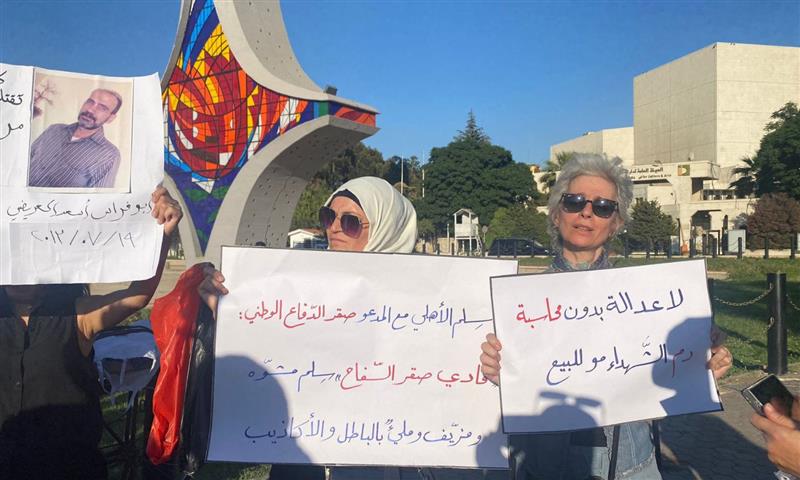
 A stand in the Omayyad Square demanding real transitional justice - June 12, 2025 (Families for Freedom Association/Facebook)
A stand in the Omayyad Square demanding real transitional justice - June 12, 2025 (Families for Freedom Association/Facebook)





 A
A
A
A
A
A

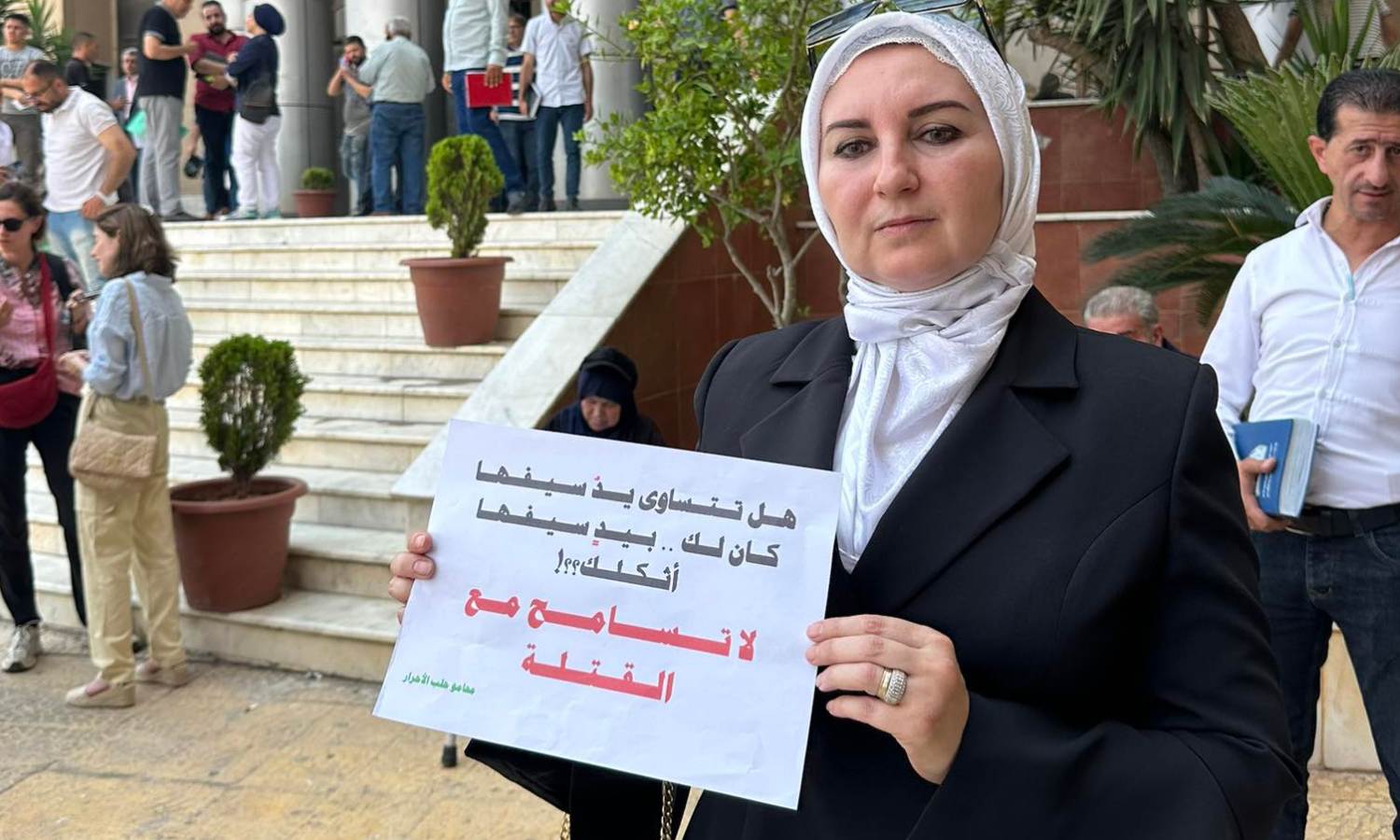



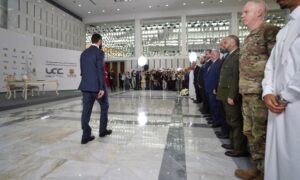

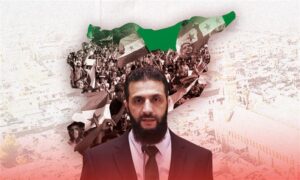
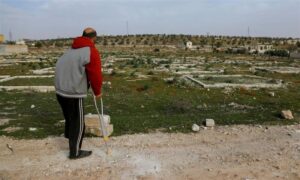
 More In-Depth
More In-Depth